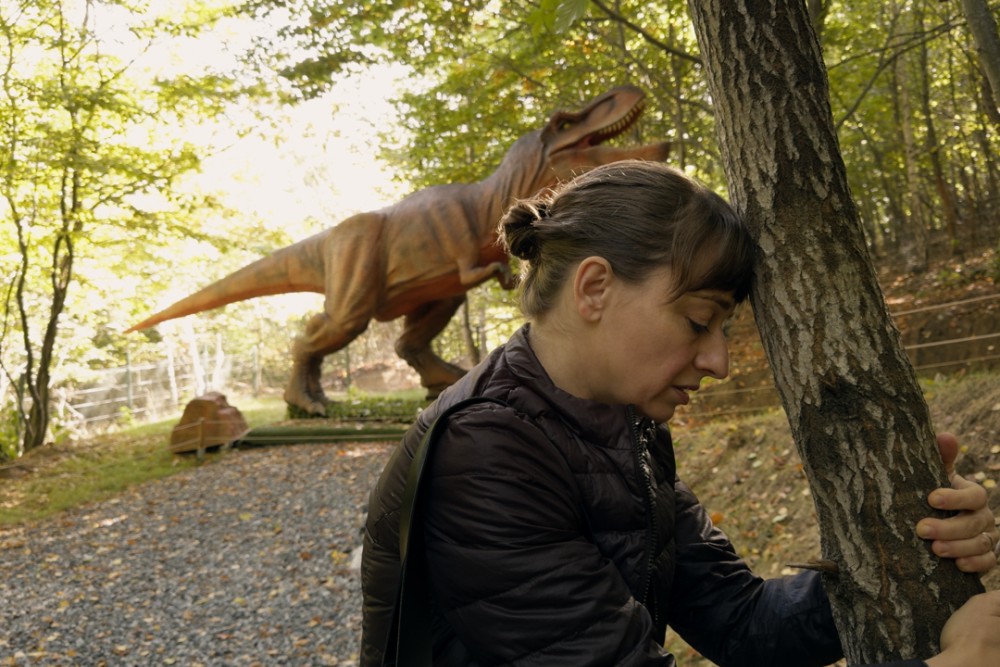It feels like an understatement to say that Radu Jude is one of the most quirky, beloved and, more importantly, exciting auteurs in contemporary arthouse cinema. One of his two new films this year, Kontinental ’25, premiered at Berlinale, where it won the Silver Bear for Best Screenplay, before making its way to the UK.
The film begins with a homeless former athlete in Cluj, Transylvania, going about his daily life. At the end of the day, when he returns to the basement that serves as his shelter, he finds himself facing eviction. In a moment of utter desperation, he dies by suicide, in a manner both brutal and helpless. The shock of his death reverberates through Orsolya, played by the brilliant Eszter Tompa, a bailiff and former law professor who carried out the eviction. Back in her everyday routines, she talks and talks, seeking relief in conversation with anyone who crosses her path, yet nothing lightens the weight of her responsibility.
Inspired by Roberto Rossellini’s Europe ’51, Jude reimagines that moral inquiry within a contemporary middle-class setting, where neo-capitalism has replaced religious doctrine as the dominant ethical framework. The film poses an uncomfortable question: what does contemporary morality mean for people like Orsolya, educated, middle class, politically left-leaning and seemingly full of conscience, yet still trapped in a neoliberal world where they must work for the very structures they reject intellectually and morally? She pleads with her superiors to delay evictions, but cannot prevent the tragedy. And Jude draws attention to a crucial shift: the foundation of right and wrong has become the law itself.
Orsolya, as a former law professor, knows she has done nothing illegal. Yet the film interrogates the nature of law in a capitalist world, where legality can be lobbied, weaponised, politicised, and hollowed out. The law is presented as a guarantor of equality and rights, but in practice it is shaped by economic power, institutional interests, and structural inequality. It claims to be neutral, yet it aligns smoothly with the needs of neo-capitalism and the people who are riding it. Law ceases to be a moral instrument. Instead, it becomes a mechanism for regulating behaviour, protecting property, and maintaining stability.
Unlike Ingrid Bergman’s Irene Girard in Europa ’51, Orsolya already understands the social reality around her and fully recognises her own complicity within the system. Yet instead of rejecting the structure, she chooses to offset her guilt through small symbolic gestures: automatic monthly donations to Woman Life Freedom, UNICEF, Gaza and Ukraine, or extending an eviction deadline and pretending that such gestures amount to meaningful moral action. She convinces herself that these acts allow her to contribute to the ideals she believes in. However, when tragedy forces the suffering of others into direct and unavoidable proximity with her own behaviour, the façade collapses. The brutality of Jude’s satire lies in its directness: a sharp portrait of how the knowledgeable middle class say one thing yet act otherwise, and how quickly their moral self-image crumbles when they can no longer pretend they are doing good.
Although deeply rooted in Romanian realities, the critique feels universal. Some of Jude’s concerns that are rooted in Romania social reality also echo those of fellow Romanian filmmaker Cristian Mungiu, whose R.M.N. (2022) dissects ethnic conflict to expose similar fractures in contemporary Europe, even though he is considered as a departure from the Romanian New Wave Mungiu represents.
Kontinental ’25 ultimately feels like a minor Jude, without the layered, multimedia experimentation of Do Not Expect Too Much from the End of the World or Bad Luck Banging or Loony Porn. Shot on an iPhone that sometimes falls out of focus, it does not resemble the polished festival films we now expect, where even an iPhone image is framed to look immaculate. Jude’s choice has its own aesthetic logic: it mirrors the way the world is now perceived through TikTok, Instagram reels, and the unstable auto-focus through which digital culture filters reality. The film unfolds in a talkative, deceptively simple manner that recalls Woody Allen and Hong Sang-soo, yet Jude’s unmistakably sharp satire, as well as his mocking, abrasive, generous cruelty, keeps the experience both enjoyable and intellectually provocative.
Kontinental ’25 functions as a deliberately self-reflective and intellectually mannered middle-class satire that aims directly at the very demographic that habitually consumes this type of work. Its core audience in the west is often culturally invested, socially liberal and financially comfortable, the same group whose film taste extends beyond the global mainstream appeal of someone like Christopher Nolan and also includes the Romanian arthouse auteurs like Radu Jude. The film’s political edge goes further by confronting the fact that they quietly sustain capitalism from a position of safety, maintaining the system even while criticising it. In that sense, the way this audience responds to the film may be even more revealing than the film itself.
Screened as part of London Film Festival on the road


Comments